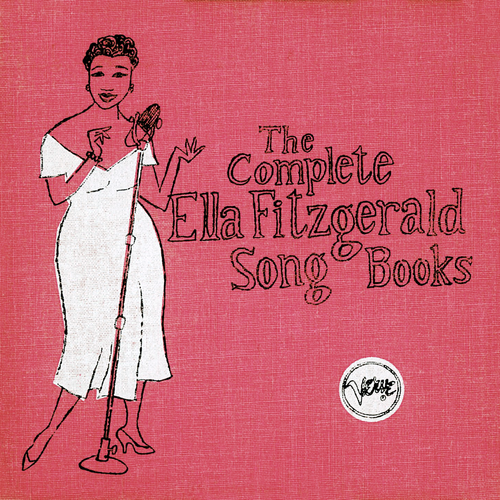Now Playing
Current DJ: The Audible Snail
Sufjan Stevens Chicago from Come On Feel the Illinoise (Asthmatic Kitty) Add to Collection
Requests? 773-DJ-SONGS or .(JavaScript must be enabled to view this email address)
 Originally a "girl singer" leading drummer Chick Webb's big band in the 1930s, Jazz vocal giant Ella Fitzgerald transformed into the iconic "First Lady of Song" during the '50s and '60s, in large part because of her Song Book albums for Verve Records. Highlighting the work of individual songwriters and teams like Cole Porter, Irving Berlin, and George and Ira Gershwin, these album helped build Fitzgerald's reputation in mainstream pop circles and solidified her legendary status in jazz as a joyful "musician's singer."
Originally a "girl singer" leading drummer Chick Webb's big band in the 1930s, Jazz vocal giant Ella Fitzgerald transformed into the iconic "First Lady of Song" during the '50s and '60s, in large part because of her Song Book albums for Verve Records. Highlighting the work of individual songwriters and teams like Cole Porter, Irving Berlin, and George and Ira Gershwin, these album helped build Fitzgerald's reputation in mainstream pop circles and solidified her legendary status in jazz as a joyful "musician's singer."
The eight Song Book albums, originally released between 1956 and 1964, are occasionally trying exercises in patience (the longest set, the Gershwin Song Book album, contains over fifty songs), but there is much excellent music on The Complete Ella Fitzgerald Song Books, released as a 16-CD box set in 1993. Some albums here, especially her Duke Ellington collection, contain much more of jazz elements than most other Song Books, but for American popular music aficionados, Fitzgerald's stunning voice, effortlessly gliding between octaves, provides a fresh alternative to the Song Book revival albums of Rod Stewart, for one, over the last decade or so. The arrangements, too, vary from the gently swinging work of Nelson Riddle (famous for his work during this period with Frank Sinatra) to the sometimes brassier charts of Paul Weston and Buddy Bregman. So with different songwriters and arrangers, each album has its own unique feel.
After hearing the single-CD compilation, The Best of the Song Books, for a couple of years, I first heard this box set in its entirety in 2003 from a library and was initially somewhat dismissive of most of it, given its high reputation in jazz history. Part of the reason was that I expected more jazzy arrangements and singing, having heard the Duke Ellington Song Book previously and enjoyed it tremendously. While to this day the Ellington Song Book has many of my favorite tracks from the box set--including stunning small group versions of "Azure," "Sophisticated Lady," "Love You Madly," and more--after listening to other albums in the box set with more patience developed over the years, I have also grown to appreciate the Harold Arlen Song Book and some others to a lesser extent, including the Johnny Mercer Song Book.
Some arrangements sound more dated than others (Bregman's sometimes cutesy charts on the otherwise brilliant Cole Porter Song Book come to mind), but Ella's voice sounds gorgeous throughout, yet particularly warm and rich on the earliest Song Books, highlighting the work of Porter, Rodgers and Hart, and Ellington. And the Song Books' substantial commercial success made them a landmark in Jazz vocals, but one key issue among critics that has often dogged these recordings is how much heartbreak Ella is not emphasizing in her singing on some of the sadder songs. For more information plus my thoughts on this controversy, check out a blog article I wrote on Ella's Song Books and interpretation here.
For this blog post, I decided to pick one or two tracks from each Song Book for a newcomer to hear:
Ella Fitzgerald Sings the Cole Porter Song Book - "Miss Otis Regrets," an ironic ballad that Fitzgerald sings tenderly despite the sadness in the story; and "Just One of Those Things," one of the more swinging arrangements on this double album.
Ella Fitzgerald Sings the Rodgers and Hart Song Book - "The Lady is a Tramp," delightfully brassy and swinging here; and "Bewitched," a 7-minute ballad slowly oozing sensuality with Ella's mellifluous singing.
Ella Fitzgerald Sings the Duke Ellington Song Book - "Love You Madly," a gently swinging mid-tempo number with members of Ellington's Orchestra in a small group setting; and "Azure," a guitar-and-vocal duet that stuns in its 2 minutes of beauty.
Ella Fitzgerald Sings the Irving Berlin Song Book - "Blue Skies," included at the end of the Song Book as the time when Ella finally cuts loose and scats glorious nonsense syllables like there's no tomorrow. It's probably one of her greatest performances.
Ella Fitzgerald Sings the George and Ira Gershwin Song Book - "'S Wonderful," a classic Nelson Riddle arrangement with a crescendo in the middle (think of his work with Frank Sinatra, like on "I've Got You Under My Skin") and a wonderfully typically joyful vocal from Ella.
Ella Fitzgerald Sings the Harold Arlen Song Book - "That Old Black Magic," another swinging record but with a different kind of "vulgar bounce" that critic Francis Davis noted in Arlen's songwriting and Billy May's arrangements; and, of all possible recordings to stand out, "Ding-Dong! The Witch is Dead" from The Wizard of Oz, which you really need to hear to believe what Ella and May do with the song.
Ella Fitzgerald Sings the Jerome Kern Song Book - maybe "A Fine Romance," another solid brassy arrangement from Riddle, though this might be my least favorite Song Book album.
Ella Fitzgerald Sings the Johnny Mercer Song Book - "Something's Gotta Give," yet another standout swinging big band number.
Next entry: Weekly Voyages: Friday December 20 to Thursday December 26
Previous entry: CHIRP Radio Best of 2013: Andy Weber